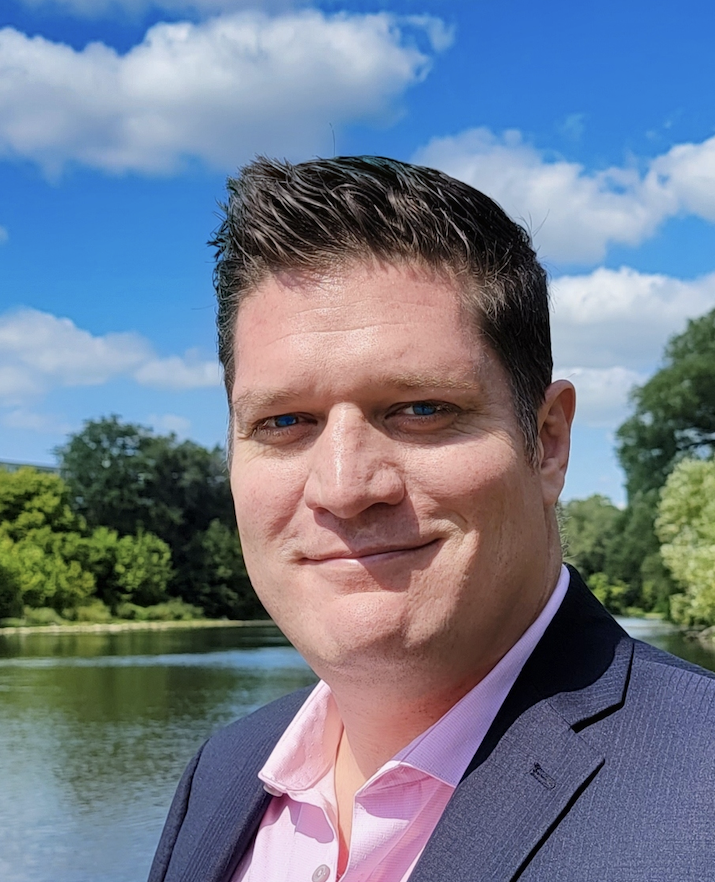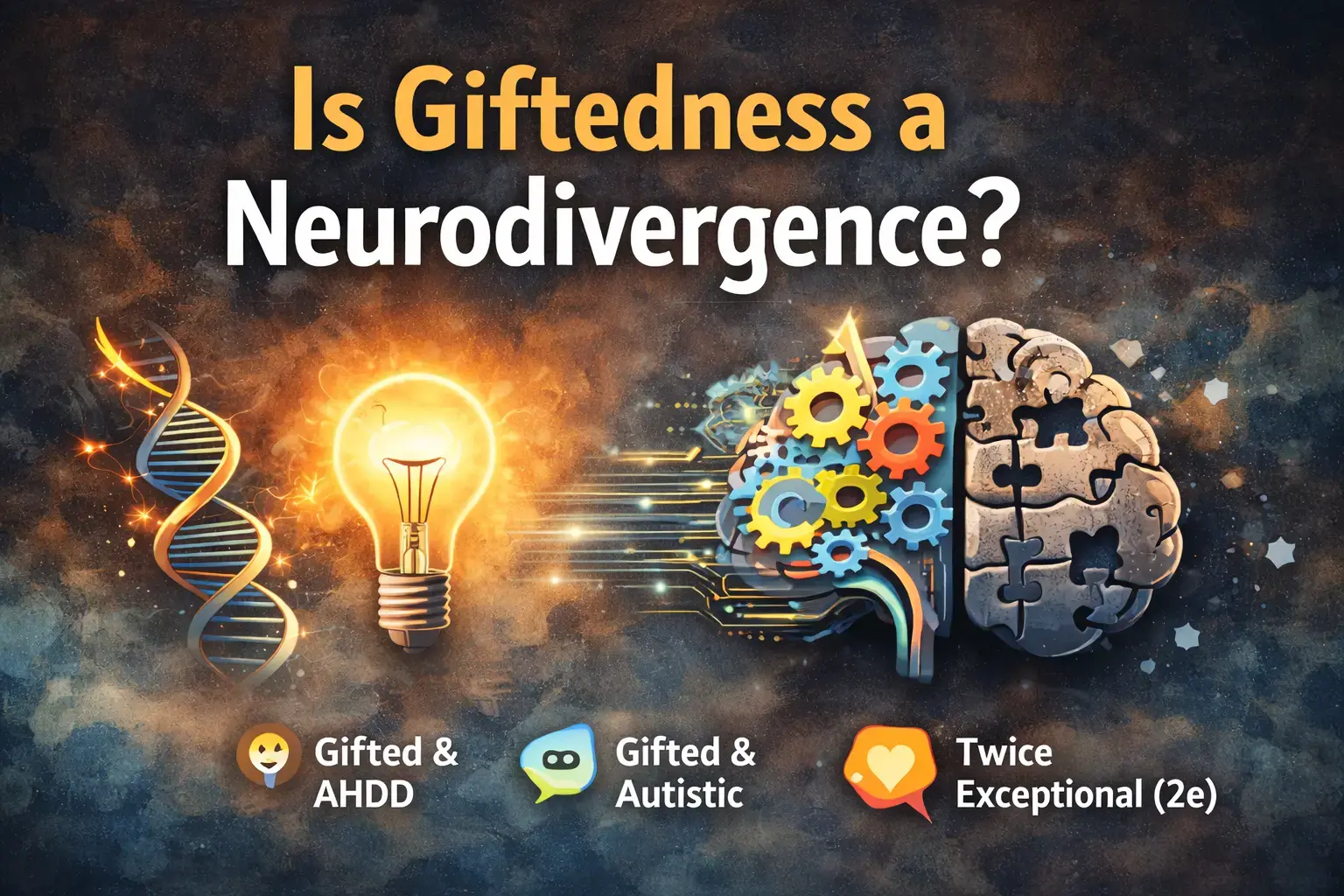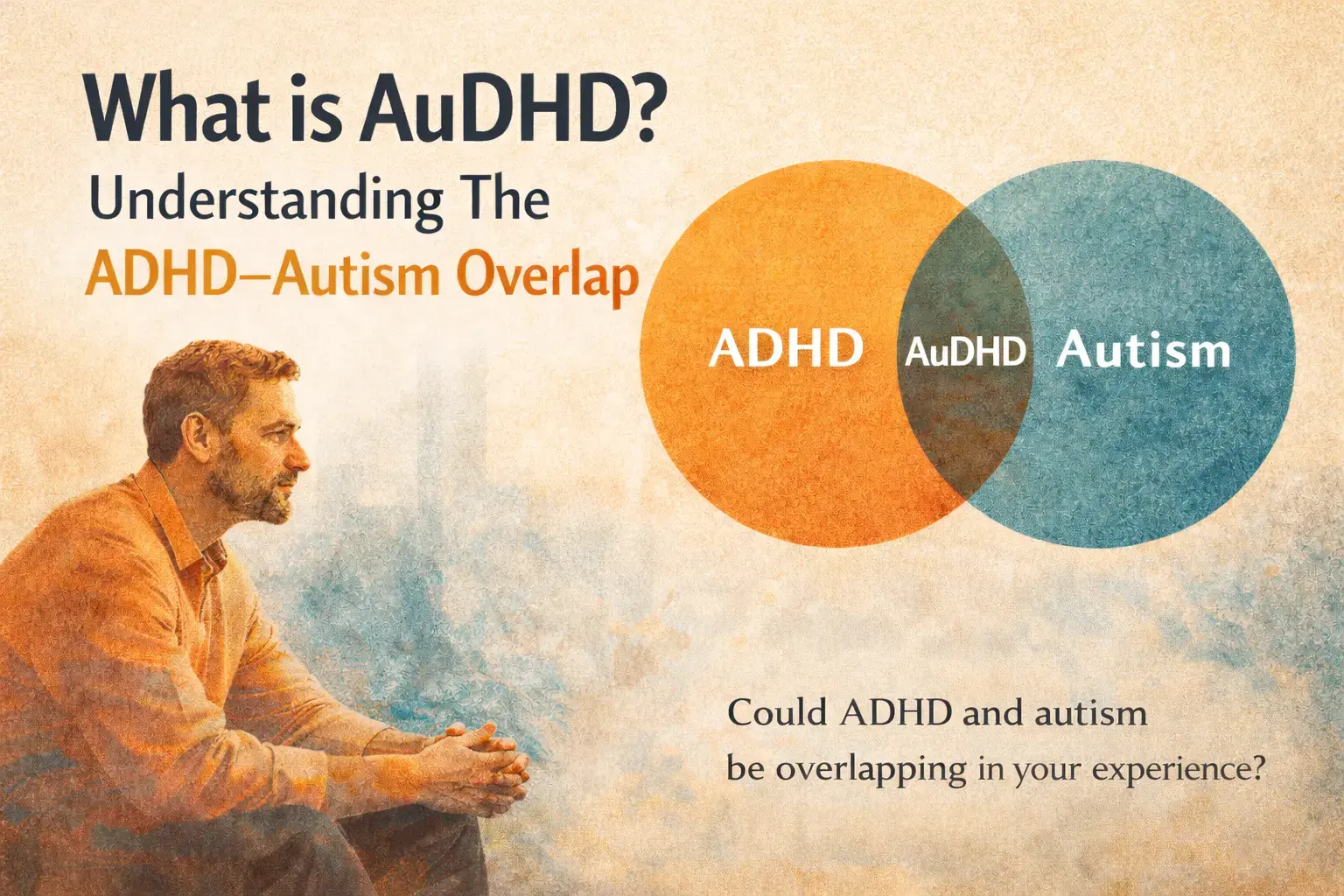Neurodivergent Men: Unique Challenges & the Value of Therapy
“If you are always trying to be normal, you will never know how amazing you can be.” Maya Angelou

I’ll never forget the day in high school when I stood at the edge of the cafeteria, bagged lunch in hand, watching my peers joke and banter as if it required no effort at all, and they did not fear reprisal. They seemed to communicate in a silent code, a swift glance here, a sarcastic tease there, while I struggled to figure out the right words, the right timing, or even the right facial expression. At the time, I didn’t realize how much neurodivergence, a term I later came across that encompasses conditions like autism, ADHD, AuDHD, and more, was influencing my social experience. I just knew I felt out of place, like an alien on a strange planet, particularly as a boy who was expected to “keep cool,” be spontaneous and follow the unwritten rules of teenage male dynamics.
In retrospect, I recognize that my challenges with communication, executive function, and emotions were intimately tied to my neurodivergent traits. Like many neurodivergent men, I had been masking these traits for years, trying to blend into the dominant culture that demanded a version of masculinity I couldn’t comfortably embody. Society often teaches men to be stoic, self-reliant, and emotionally reserved. However, for men with ADHD or autism, these rigid norms can feel impossible to meet. When you add in the pressure to perform, provide, and stay silent about any perceived weakness, it becomes a recipe for loneliness, anxiety, particularly social anxiety, and relentless self-criticism.
This blog explores the ways neurodivergent men navigate a world that isn’t always designed for them, covering the core challenges they face, from social masking and emotional isolation to relationship misunderstandings and career pressures. We’ll also look at how therapy for neurodivergent men can be a powerful tool for self-understanding and growth. By sharing both personal insights and practical strategies, my hope is that you’ll realize you are not alone and that real, affirming help is available.
You may appreciate learning more about autism support and therapy.
Societal Expectations and Masking
Rigid Masculine Norms
In many cultures, there’s a clear blueprint for what a “real man” should be: tough, unemotional, and fiercely independent. For neurodivergent men, living up to these stereotypes can feel both unnatural and exhausting. Consider men with ADHD who find it difficult to maintain consistent focus or emotional restraint. Or autistic men who struggle to comprehend unwritten social rules and body language cues. When society insists on stoicism, these individuals can feel as if their natural tendencies, like sensitive emotional reactions or a need for clear, direct communication, are unwelcome.
What does the term “masculinity” mean to me, and how has it influenced the way I cope with my neurodivergent traits?
Masking in Autism and ADHD
Many neurodivergent individuals cope by masking, a term describing the conscious or subconscious act of hiding one’s authentic traits to blend in. Masking in autism might involve imitating others’ facial expressions or forcing eye contact despite discomfort. For men with ADHD, it could mean pretending to have it all together even as one’s mind constantly jumps from one idea to the next. Although masking may offer short-term benefits, like fewer awkward social encounters, it often leads to burnout, increased anxiety, and a deep sense of living a life inconsistent with who you are, which often comes with it’s own set of mental health challenges.
Why It’s Challenging: Constantly conforming to societal ideals that undervalue emotional openness can make it difficult for men to identify and honour their own needs. Over time, the cognitive load of masking drains energy, potentially leading to chronic stress or depression.
In what ways have I been masking or hiding my authentic self, and what might I gain by lowering that mask?
Emotional Loneliness and Isolation
Difficulty Expressing Emotions
Our culture frequently discourages men from showing vulnerability, labelling emotional expression as a sign of weakness. For neurodivergent men, who may already find it challenging to name, process, or articulate their emotions, this social script can create an emotional dead-end. If you’re a man who struggles with sensory overload, you might feel overwhelmed but stay silent for fear of being seen as “too sensitive.”
Emotional Loneliness in Men
Because men are expected to suppress their emotions, they often feel isolated. Neurodivergent men who don’t fit the traditional mould can feel even more alienated, compounding a sense of emotional loneliness. This isolation isn’t merely about not having friends; it’s about missing the deeper level of connection that comes from mutual understanding and acceptance.
Why It’s Challenging: Without safe outlets or supportive communities, neurodivergent men may internalize their struggles, leading to heightened anxiety, low self-esteem, and even a risk of mental health crises.
Relationship & Interpersonal Struggles
Navigating Social Nuances
One of the hallmark traits of neurodivergence, particularly autism, is difficulty reading or interpreting social cues like body language, tone of voice, or subtle hints. This can lead to frequent misunderstandings in friendships, family gatherings, and especially romantic relationships. Partners (or potential partners) might assume, “He doesn’t care about my feelings,” when in reality, the neurodivergent individual is simply missing the cues or is unsure how to respond in a socially expected manner.
Fear of Rejection
Constant worry about being perceived as “weird” or “cold” can push neurodivergent men to avoid social interactions altogether. This results in fewer opportunities to develop connection skills and fosters an ongoing cycle of social withdrawal and loneliness.
Why It’s Challenging: Relationships often rely on unspoken rules. When neurodivergent men can’t access these rules intuitively, the result may be repeated misunderstandings, leading to heartbreak or social isolation.
What strengths or unique perspectives do I bring to my relationships, work, or personal life because of my neurodivergence?
Difficulty Advocating for Needs
Internalized Shame
Society often tells men to “deal with it” or “toughen up.” When a neurodivergent man struggles with organization or experiences sensory overload, he may feel shame because he can’t simply “push through” like others seem to do without becoming exhausted. The shame is exacerbated by seeing one’s unique traits as personal failings rather than natural variations.
Lack of Formal Diagnosis
Many men with ADHD or autism go undiagnosed until adulthood. They might suspect something is different, but without formal recognition, they can’t easily request workplace accommodations or get appropriate support. It’s also not uncommon for men to avoid seeking a diagnosis altogether, fearful that it would confirm their “weakness” or marginalize them further.
Why It’s Challenging: Lacking self-knowledge and external validation can discourage men from speaking up about their needs or struggles, leading to unaddressed stress and potential burnout.
Career Pressures
Struggle with Executive Function
For men with ADHD, tasks like planning, organization, and time management can be extremely demanding. Even highly skilled professionals can struggle to stay on top of deadlines or maintain consistent productivity. In competitive job markets, these challenges may undermine confidence and career progression.
Concealing Struggles
Fearing stigma or professional repercussions, many men try to hide their difficulties at work. They might not request accommodations like flexible hours or noise-cancelling headphones, thus worsening their stress, fatigue, or burnout. The attempt to appear “normal” or “high-performing” further distances them from potential resources and empathic colleagues.
Why It’s Challenging: Workplaces often operate on traditional standards of productivity, leaving minimal room for neurodiverse approaches such as flexible scheduling, frequent breaks, or tailored project structures.
“In the middle of difficulty lies opportunity.” – Albert Einstein
Strategies or Solutions: Therapy for Neurodivergent Men
For a long time, I believed I was just “bad at being a man.” While other guys seemed to get along with each other, juggle social events, family obligations, and professional responsibilities without batting an eye, I was constantly on edge, trying not to disappoint anyone while feeling an ongoing sense of dread. If I missed social cues or said something I regretted, I’d spiral into self-criticism: Why can’t I handle what everyone else handles so easily?
It wasn’t until my late thirties that reading about neurodivergence, particularly relating to how ADHD presents, felt like looking in a mirror. The more I learned, the more I realized my “failings” were simply patterns of thinking and perceiving that needed understanding, not judgment. By finally acknowledging my challenges, such as executive function difficulties and overstimulation in chaotic environments, I discovered a path to self-acceptance. Therapy became a lighthouse in the storm, guiding me toward practical skills, healthier self-talk, and a newfound ability to communicate my needs with less shame.
“Success is not final, failure is not fatal: it is the courage to continue that counts.” Winston Churchill
If understanding relational patterns is helpful, my article on neurodivergent men & relationship challenges may offer clarity.
Potential Strategies and Solutions
- Recognize and Reframe Unique Strengths: A neurodiversity-affirming therapist can help men see their so-called “shortcomings” through a new lens. For instance, if you are a man with ADHD or autism who possesses intense hyper-focus when they’re passionate about a subject, that can be harnessed as an asset in certain jobs or creative endeavours. If you’re an autistic man who excels at noticing intricate details, that’s a skill that can be an asset in many technical or analytical roles.
- Develop Self-Compassion: It’s hard to replace years of negative self-talk without guidance. Therapy sessions can introduce mindfulness and self-compassion exercises tailored to neurodivergent men. Compassionately looking at cognitive restructuring helps identify unhelpful thought patterns, e.g., I’m not man enough because I can’t handle group events, and transform them into more balanced, affirming beliefs while learning to be accepting of our emotional experiences.
- Enhance Emotional Regulation: Men are often taught to bottle up feelings, which backfires when dealing with neurodivergent challenges such as sensory overload or rapid emotional shifts common in ADHD. Therapy can include emotion-focused skills that teach naming, understanding, and managing emotions more effectively. Practicing breathing exercises, keeping a journal, or learning grounding techniques can mitigate the stress of feeling “out of control.”
- Improve Communication Skill: Interpersonal relationships can become a major stumbling block for men who aren’t sure how to express vulnerability or interpret subtle social signals. Therapy for neurodivergent men can involve role-playing scenarios, developing social scripts for challenging conversations, and learning new perspectives on social interactions and how we approach them. Over time, these efforts reduce the anxiety around social interactions and help build deeper, more honest connections.
- Build Tailored Coping Strategies: A therapist familiar with neurodiversity can assist in creating organizational systems, like digital reminders or structured daily planners, to aid with executive function. For those grappling with sensory sensitivities, therapy might recommend noise-cancelling headphones, scheduled downtime, or controlled lighting in living and working spaces. Each man’s set of strategies can be customized to address his unique triggers and challenges, making daily life far more manageable.
Neurodivergent men face a distinctive set of hurdles, from social expectations that contradict their authentic selves to the emotional toll of constant masking, misunderstandings, and unrelenting career pressure. Yet recognizing and embracing your neurodivergence can be a turning point. Instead of trying to fit an impossible mould, you can learn to celebrate the strengths you already possess, such as creativity, hyper-focus, or unique problem-solving skills and seek the support necessary to navigate the parts of life that prove more challenging.
On a personal level, I’ve come to see my neurodivergent traits not as liabilities but as integral parts of who I am. Therapy played a pivotal role in that transformation, giving me the tools to manage anxiety, communicate openly and effectively, and appreciate the benefits of thinking differently. It’s a journey that’s still unfolding, but it’s one I embrace wholeheartedly now.
If any of the above resonates with you, or if you suspect neurodivergence might be part of your story, don’t hesitate to reach out to a mental health professional. Look for therapy for neurodivergent men or support groups in your area, and remember that online therapy platforms can also connect you with specialists who understand your unique experiences. You deserve a space where your questions, traits, and who you are is honoured rather than invalidated.
You are not alone in navigating these complexities. By seeking help, cultivating self-awareness, and challenging the notion that you must “man up” in the face of every problem, you can discover more fulfilling ways to live, love, and work. Embrace your neurodivergence, find the right support system, and watch as your potential and sense of self-worth become more evident and you learn to accept yourself as you are.
Final Words
Navigating life as a neurodivergent man has unique challenges, but you are not alone in this experience. If aspects of this blog resonate with you, consider reflecting on the patterns that shape your relationships, self-perception, and emotional well-being. Your experiences are valid, and finding ways to honour your authentic self while managing the pressures of societal expectations is an ongoing journey, one that you deserve to navigate with self-compassion and acceptance.
Warmly,
Michael
“The curious paradox is that when I accept myself just as I am, then I can change.” – Carl Rogers
Navigating life as a neurodivergent man can be challenging, whether it's balancing social expectations, managing executive functioning, or simply finding spaces where you feel truly understood.
If you’d like to learn more about how I support neurodivergent men who may feel uncertain about therapy, you can visit my About page, where I share my lived experience and relational approach.
If this post speaks to your own hesitations about therapy, you can reach out through my contact page to explore what support could look like for you.
Or stay on the blog and learn more about ADHD, Autism, and Giftedness.
FAQ: You’ve realized your Neurodivergence impacts your life in ways you didn't notice?
1. What if I don’t have a formal diagnosis yet?
It’s entirely possible to benefit from therapy without an official diagnosis. A neurodiversity-affirming therapist can guide you through self-discovery, coping techniques, and potential accommodations. Seeking a formal evaluation down the line may open doors to specialized support or workplace adjustments, but it’s not a prerequisite to start therapy.
2. Is it normal to feel “imposter syndrome” about being neurodivergent?
Yes. Especially if you’ve masked your traits for a long time, you might question whether your experiences are “legitimately” rooted in ADHD, autism, or another condition. Therapy can help you work through these doubts by offering a safe space to explore your history and daily challenges, validating your lived experience.
3. How do I find a therapist who understands neurodiversity?
Look for mental health professionals who offer neurodiversity-affirming care and support autism in men, ADHD in men, or men’s mental health. Browse directories (Like Psychology Today), read therapist bios, and don’t hesitate to ask direct questions about their experience working with neurodivergent clients. An initial consultation can clarify whether their approach resonates with your needs.
4. Will therapy force me to become more “typical”?
Absolutely not—at least not if the therapist practices a neurodiversity-affirming perspective. The goal is to help you develop healthy coping strategies, self-awareness, and communication skills that align with your authentic self. It’s not about erasing your uniqueness but embracing it.
5. Can group therapy or support groups help?
Yes. Peer support settings allow you to share stories, challenges, and advice with others who “get it.” Hearing different perspectives can normalize your feelings and reduce isolation. These groups can be particularly beneficial for practicing social interactions in a low-pressure environment.
6. I’m worried about judgment if I seek therapy.
It’s common for men to fear being labelled as “weak” or “less masculine” if they pursue mental health support. However, seeking therapy is a proactive step to manage challenges and enhance well-being. Prioritizing men’s mental health is more important than conforming to outdated social expectations.
Also read: Why Neurodivergent Men Struggle to Recognize Their Needs and Neurodivergent Relationship Challenges.

Resources:
Attwood, T. (2007). The complete guide to Asperger’s syndrome. Jessica Kingsley Publishers.
Maté, G. (2023). The Myth of Normal: Trauma, Illness, and Healing in a Toxic Culture.
Hull, L., Petrides, K. V., Allison, C., Smith, P., Baron-Cohen, S., Lai, M.-C., & Mandy, W. (2017). Masking in autism: A survival strategy or a cause of psychological distress? Journal of Autism and Developmental Disorders, 47(8).
Silberman, S. (2015). Neurotribes: The legacy of autism and the future of neurodiversity. Avery.
Singer, J. (1999). Why can’t you be normal for once in your life? From a ‘problem with no name’ to the emergence of a new category of difference. In M. Corker & S. French (Eds.), Disability discourse (pp. 59–67). Open University Press.
Blog Disclaimer
This blog includes occasional personal anecdotes used to illustrate therapeutic ideas and foster connection. All identifying details have been altered or omitted to protect confidentiality. These reflections are intended as examples only; every individual’s experience is unique, and what resonates for one person may not apply to another.
The information provided here is for educational and informational purposes and should not be considered a substitute for professional medical or mental health advice, diagnosis, or treatment. If you have concerns about your health or well-being, please consult a qualified healthcare provider or licensed mental health professional.
Psychotherapy services described on this site are available to residents of Ontario. If you are interested in support or would like to schedule a complimentary 20-minute consultation, you are welcome to contact me through my practice.
These resources are offered to support your learning and self-understanding as you move toward a more grounded, authentic, and meaningful life.

Michael Holker HBA, BSW, MSW
Michael Holker, MSW, RSW, is the compassionate heart behind Becoming Yourself Counselling. Discovering his own neurodivergence later in life shaped his existential, humanistic, and strengths-based approach to therapy. Guided by his lived experience, Michael helps neurodivergent individuals move beyond self-criticism toward self-understanding, self-compassion, and self-acceptance. His work invites clients to honour their journeys, embrace their resilience, and reconnect with their authentic selves, cultivating a life of greater alignment and meaning.


